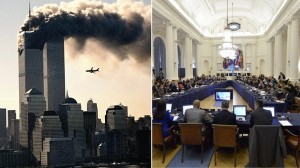Carlos Sánchez Berzaín
September 12, 2018
 (Interamerican Institute for Democracy) Two historic events that have marked the 21st Century happened on 11 September of 2001. The terrorist attack against the United States by the Al-Qaeda network (9/11) and the signing, in Lima, Peru, of the Interamerican Democratic Charter (IDC) by the member states of the Organization of American States (OAS). The terrorist attacks and the reaction to them resulted in dramatic changes throughout the world, and the IDC institutionalized democracy in the Americas. Seventeen years later, the challenge is to revert the negative effects of 9/11 and end dictatorships.
(Interamerican Institute for Democracy) Two historic events that have marked the 21st Century happened on 11 September of 2001. The terrorist attack against the United States by the Al-Qaeda network (9/11) and the signing, in Lima, Peru, of the Interamerican Democratic Charter (IDC) by the member states of the Organization of American States (OAS). The terrorist attacks and the reaction to them resulted in dramatic changes throughout the world, and the IDC institutionalized democracy in the Americas. Seventeen years later, the challenge is to revert the negative effects of 9/11 and end dictatorships.
The 9/11 or 11-S (in Spanish) against the U.S. involved four simultaneous suicidal attacks perpetrated by 19 members of the Jihadist network known as Al-Qaeda through the piracy of four commercial aircraft, two of which impacted against the Twin Towers in New York, one crashed into the Pentagon, and a fourth airplane apparently aimed at the U.S. Capitol where they were not successful. That day, they caused 3,016 dead and over 6,000 injured, birthing the global policy of “war against terrorism”, the war in Afghanistan and the war in Iraq. They changed the world, from the way passengers board commercial flights, to the development of technology to prevent the reoccurrence of these criminal events.
While in Lima, Peru, the Interamerican Democratic Charter was being signed into adoption as part of a historical event, this was overshadowed by the severity of the terrorist attacks of 9/11. U.S. Secretary of State, Colin Powell left the Charter signed, before the event, and hurriedly returned to the U.S. The IDC is the result of the most stable period of democracy in the region and when it was signed there was only one dictatorship in the Americas, the Castroist of Cuba. The IDC establishes that “the peoples of the Americas have the right to democracy and their governments have the obligation to promote and defend it” and sets out “the essential components of democracy” among other standards instituted as obligatory.
The intense focus of the U.S. in the war against terrorism and the wars in Afghanistan and Iraq brought about its gradual strategic retreat from Latin America and the absence of a consistent foreign policy for the region. With the rise of Hugo Chavez to power in Venezuela and his immediate alliance with Fidel Castro, there had been since January of 1999, an ongoing process of stabilization and salvage of Cuba’s dictatorship and the re-creation -surreptitiously at the beginning- of the failed expansion of the Cuban revolution in the Americas as a “Bolivarian project”. These political facts were ignored, dodged, or minimized.
While the U.S. was retreating in its cooperation programs, support to democracy, judicial strengthening, fight against corruption and even antinarcotics and its already fragile means of coordination in military matters, intelligence, and fight against crime, were diminishing, in Latin America vast amounts of money and resources were doled out by Hugo Chavez who, through coup d’états, corruption, populism and a disguise of democracy, was expanding his “ALBA” or Bolivarian project of 21st Century Socialism” known today as “Castroist Chavist”.
Far too many of the U.S. and world’s “Latin American experts” from the public sector and academia, believed and supported the “democratic and social justice growth” discourse in the Chavez-Castro alliance, when what was truly happening -as the results show today- was the building of; dictatorial regimes who violate freedom and human rights, narco-states justified in the antiimperialist fight, and “Organized Crime’s regimes” that control Cuba, Venezuela, Nicaragua, and Bolivia. In Argentina and Brazil, they left the government but not the power, and are a threat to democracies.
A glimpse at the 21st Century thus far in the region shows, as objective reality, a severe regression in democracy, Human Rights and freedom as the result of the successful expansion of “dictatorships of 21st Century Socialism” or Castroist Chavist, who have produced political prisoners and exiles, manipulate justice, commit torture, assassinations, massacres, forced migration, narco-states, economic crises, and a humanitarian crisis. Four Castroist Cubas instead of just one. If we take 11 September of 2001 as a benchmark, we will see that 17 years later, the problems are more severe, the threats more concrete, and the confrontation real.
Hope rests in the fight of the Cuban, Venezuelan, Nicaraguan, and Bolivian people to rescue their freedom and democracy, in decided efforts of democratic governments for their own security, and in the application of the new Foreign Policy of the U.S., that signals a return to the defense of its principles and values that, moreover, coincide with its interests in the region.
Published in Spanish by Infobae.com on Sunday September 09, 2018
Translated from Spanish by: Edgar L. Terrazas, member of the American Translators’ Association, ATA# 234680.
 Carlos Sanchez Berzain Abogado | Estadista | Político | Politólogo
Carlos Sanchez Berzain Abogado | Estadista | Político | Politólogo